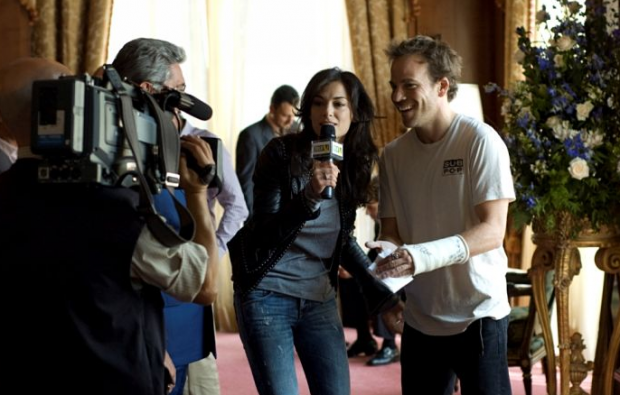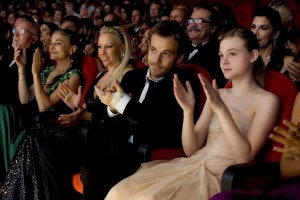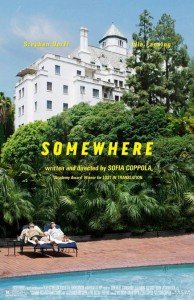
Many months have passed since there has been a film release this arrogant. Somewhere is an unmistaken director’s art film, in this case, Sofia Coppola (“Lost in Translation,” “Marie Antoinette”). Coppola provides an opportunity for the former Hollywood brat Stephen Dorff (“The Power of One,” “I Shot Andy Warhol”) to reboot his dithering career with a serious and image-redefining role to challenge his acting chops. As Johnny Marco, the impassive Dorff is playing one of those coasting yet depressed movie stars who has reached an early midlife crisis because his life is so vacuous and unimportant. Dorff is still an immalleable cinderblock of a talent.
The film is likely to be showered with rave reviews by select critics who applaud its (natural, documentary-like) verité style, and in the way it introspectively looks at a man’s unhappy acknowledgement of his suffocated vanity. In other words, you should be able to pat yourself on the back if you understand it – that would be a passed test of your intelligence if you get ennui. But it doesn’t mean that it is entertaining. It also doesn’t mean that you haven’t seen and understood this material before, especially if you have seen Antonioni.
This is the kind of film that opens with an endless planted camera placement shot of Johnny driving his Ferrari around in an endless loop, just because Johnny likes to test his sport car’s horsepower. Then it cuts to a planted camera placement shot of Playboy Playmate twins Kristina and Karissa Shannon doing a private pole-dancing show for a half-asleep Johnny in his hotel room. Coppola doesn’t cut away from the twin’s clumsy moments on the pole – the camera observes the natural “real time” behavior. This should be a titillating moment, but somehow this scene even gets boring.
Johnny is staying at the Chateau in Hollywood, which for decades has catered to movie stars who use it to make temporary residence and party. In the press notes handed to critics, Coppola says that the old Chateau that she remembered growing up was a much more private and hedonistic affair and that it has changed (now stars go there to be photographed). Johnny has random flings with beautiful girls with rooms across the hall, other beautiful girls take their tops off on their balconies (in long-shot), and random actor self-congratulatory jamborees happen just about every night. Johnny is in town to do a press junket for his latest movie; it appears that Johnny stars in shallow “action” stuff. He also gets random text messages, from dumped girls he can’t remember, that carp him about what a dirtbag he is. A fine line exists between dirtbag and shitty human being, and Johnny is questioning himself internally (much of this movie’s thought process is internal, not external).
 Neither the film nor Johnny is much interested in getting into background information, but Johnny does have an ex-wife he rarely sees and he does take out his estranged pre-teen daughter Cleo (Elle Fanning, sister to Dakota). Johnny takes in closer observation of his daughter – how human! – while she performs at ice skating practice. We know that dad wants to pay attention like no time before because Coppola keeps the shot running forever. Eventually, Johnny’s ex flees from town which leaves Cleo in his care. We recognize that Johnny is becoming a changed person because he goes from less random night flings to nearly no flings while Cleo is under his care.
Neither the film nor Johnny is much interested in getting into background information, but Johnny does have an ex-wife he rarely sees and he does take out his estranged pre-teen daughter Cleo (Elle Fanning, sister to Dakota). Johnny takes in closer observation of his daughter – how human! – while she performs at ice skating practice. We know that dad wants to pay attention like no time before because Coppola keeps the shot running forever. Eventually, Johnny’s ex flees from town which leaves Cleo in his care. We recognize that Johnny is becoming a changed person because he goes from less random night flings to nearly no flings while Cleo is under his care.
Gliding back and forth between low decibel scenes of mundane daily behavior and party frenzies, Coppola is attempting, in Vincent Gallo (“The Brown Bunny”) fashion, to let raw behavior dwell through the everyday ordinary. But the trouble is that despite the exposé on the superficial Hollywood façade, not much of anything happens. Will Johnny become a better parent to Cleo?
Coppola, in her “Lost in Translation” ambiguity guise, has a bittersweet wave goodbye between characters. Only to be followed by a closing final shot that isn’t intriguing, just maddeningly vague and unsatisfactory. Will cine-geek clubs worldwide come together and analyze this “nothingness” shot of Johnny abandoning his car in the desert and walking, walking, walking? Nope, I think not. Who cares?
98 minutes. Rated R.
DRAMA / CHARACTER STUDY / WEEKEND WITH A BOTTLE OF CHATEAU WINE
Film Cousins: “L’avventura” (1960, Italy); “Red Desert” (1964, Italy); “The Brown Bunny” (2003); “Lost in Translation” (2003).





